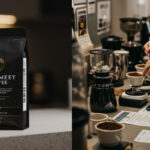
Specialty vs Traditional Coffee: Understanding the Characteristics and Flavors
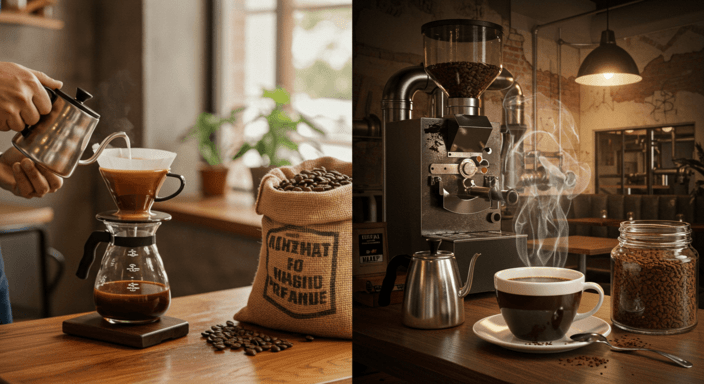
Table of Contents
ToggleCoffee is more than just a morning pick-me-up—it’s an art, a science, and a cultural experience. But not all coffee is created equal. If you’ve ever heard the term “specialty coffee” and wondered how it differs from traditional coffee, this article will help you understand the key differences in quality, taste, and production.
Whether you’re a casual coffee drinker or an aspiring connoisseur, knowing what sets specialty coffee apart can elevate your coffee experience.
1. What Is Traditional Coffee?
Traditional coffee refers to mass-produced, commercially available coffee that you typically find in supermarkets, fast-food chains, and large coffee brands. It includes:
- Instant coffee (freeze-dried granules for quick preparation)
- Pre-ground coffee (sold in sealed packages for drip machines)
- Blended coffee (mixing lower and higher-quality beans to keep costs low)
Characteristics of Traditional Coffee
✅ Lower price – More affordable due to large-scale production.
✅ Standardized flavor – Designed for consistency rather than uniqueness.
✅ Blend of beans – Often includes lower-quality beans or a mix of Arabica and Robusta.
✅ Higher bitterness – Due to over-roasting and lower-quality beans.
✅ Commonly pre-ground – Loses freshness faster than whole-bean coffee.
Who Drinks Traditional Coffee?
🔹 People who prioritize convenience and affordability over taste.
🔹 Those who enjoy strong, bold flavors without much complexity.
🔹 Consumers who buy coffee in bulk or drink it as a quick energy boost.
2. What Is Specialty Coffee?
Specialty coffee is high-quality coffee that has been carefully grown, processed, and roasted to highlight its unique flavors. It is graded 80+ points on a 100-point scale by professional coffee tasters (Q Graders).
Unlike traditional coffee, specialty coffee focuses on:
- Single-origin beans – Coffee from a specific region, farm, or even a single lot.
- Unique flavor profiles – Notes of fruit, chocolate, floral, or nutty tones.
- Sustainable and ethical farming – Often organic, shade-grown, and fair trade.
- Fresh roasting and grinding – Beans are usually sold whole to preserve freshness.
Characteristics of Specialty Coffee
✅ Higher quality – Only premium Arabica beans, handpicked for perfection.
✅ Complex flavors – Bright acidity, natural sweetness, and diverse tasting notes.
✅ Freshly roasted – Sold in small batches with precise roast profiles.
✅ Ethically sourced – Supports fair trade, sustainability, and small farmers.
✅ Prepared with precision – Brewed using pour-over, French press, espresso, and other artisanal methods.
Who Drinks Specialty Coffee?
🔹 Coffee enthusiasts who appreciate flavor complexity and freshness.
🔹 People interested in ethically sourced and sustainable coffee.
🔹 Those who enjoy exploring different origins, roasts, and brewing methods.
3. How Are Specialty and Traditional Coffees Processed?
| Step | Traditional Coffee | Specialty Coffee |
|---|---|---|
| Farming | Large, high-yield plantations | Small farms with precise care |
| Bean Selection | Machine-harvested, mixed quality | Handpicked, only the best beans |
| Processing | Quick drying, less attention to defects | Washed or natural methods for purity |
| Roasting | Dark, mass-produced for uniform taste | Small-batch roasting to enhance flavors |
| Grinding & Brewing | Pre-ground for convenience | Freshly ground for optimal flavor |
4. Flavor Comparison: What Do They Taste Like?
Traditional Coffee: Strong and Consistent
- Flavor: Bold, bitter, sometimes burnt or flat.
- Aroma: Dark chocolate, smoky, nutty.
- Acidity: Low, due to darker roasting.
- Best for: Drip coffee machines, espresso, and instant coffee.
Specialty Coffee: Bright and Complex
- Flavor: Smooth, naturally sweet, with fruity or floral notes.
- Aroma: Bright, aromatic, with layered complexity.
- Acidity: Higher, bringing out more vibrant flavors.
- Best for: Pour-over, French press, espresso, and cold brew.
5. Price: Why Is Specialty Coffee More Expensive?
Traditional Coffee: Budget-Friendly
- Large-scale production = lower costs.
- Uses lower-quality beans and blends.
- Longer shelf life but less freshness.
Specialty Coffee: Worth the Extra Cost?
- Requires more labor, precision, and quality control.
- Comes from single-origin farms with limited supply.
- Offers a more enjoyable and refined drinking experience.
6. Which One Should You Choose?
| Preference | Best Choice |
|---|---|
| I want cheap, quick coffee | Traditional coffee |
| I enjoy rich, smooth flavors | Specialty coffee |
| I drink coffee for the caffeine boost | Traditional coffee (Robusta blends) |
| I care about ethically sourced beans | Specialty coffee |
| I love experimenting with different flavors | Specialty coffee |
Conclusion: Elevating Your Coffee Experience
Whether you prefer traditional coffee for convenience or specialty coffee for taste and quality, there is no wrong choice—only the one that fits your lifestyle.
If you’ve never tried specialty coffee, consider exploring different single-origin beans, lighter roasts, and manual brewing methods. You might discover a whole new appreciation for coffee’s natural flavors!
At the end of the day, the best coffee is the one that makes you happy—so drink what you love and enjoy every sip. ☕✨
Frequently Asked Questions (FAQ)
1. What is the main difference between specialty and traditional coffee?
Specialty coffee refers to high-quality beans that are meticulously sourced, roasted, and brewed to highlight unique flavors and characteristics. Traditional coffee, on the other hand, often involves mass-produced beans with a focus on consistency and affordability, sometimes at the expense of flavor complexity.coffeewithfinance.com
2. How are the beans sourced differently in specialty and traditional coffee?
Specialty coffee beans are typically sourced from specific regions, farms, or even single lots, emphasizing traceability and unique flavor profiles. Traditional coffee often uses blends from various regions to maintain a consistent taste, without emphasizing the origin.coffeewithfinance.com
3. Do specialty and traditional coffees taste different?
Yes, specialty coffees often exhibit complex and diverse flavor profiles, including notes of fruit, chocolate, floral, or nutty tones. Traditional coffees tend to have a more uniform and straightforward taste, often described as bold or robust, but with less nuance.coffeewithfinance.com+1coffeewithfinance.com+1
4. Is there a difference in how specialty and traditional coffees are brewed?
While both types can be brewed using various methods, specialty coffee enthusiasts often prefer techniques like pour-over or French press to accentuate the beans’ unique flavors. Traditional coffee is commonly brewed using drip machines or percolators, focusing on convenience and consistency.
5. Why is specialty coffee often more expensive than traditional coffee?
The higher price of specialty coffee reflects the careful sourcing, labor-intensive processing, and smaller-scale production that prioritize quality and flavor. Traditional coffee benefits from economies of scale, making it more affordable but often at the cost of flavor complexity.
6. Can I find single-origin beans in traditional coffee?
Single-origin beans are a hallmark of specialty coffee, highlighting specific regional characteristics. Traditional coffee typically relies on blends from multiple regions to achieve a consistent flavor profile, making single-origin offerings less common.coffeewithfinance.com
7. How does the roasting process differ between specialty and traditional coffee?
Specialty coffee roasting focuses on bringing out the unique flavors of the beans, often resulting in lighter roasts. Traditional coffee may use darker roasts to achieve a uniform taste, sometimes overshadowing the beans’ inherent flavors.
8. Is specialty coffee always better than traditional coffee?
“Better” is subjective and depends on personal preference. Specialty coffee offers diverse and unique flavors for those seeking variety and complexity. Traditional coffee provides a consistent and familiar taste that many people enjoy.
9. Are there different health benefits between specialty and traditional coffee?
Both types offer similar health benefits associated with coffee consumption, such as improved alertness and potential antioxidant properties. However, specialty coffee’s emphasis on quality may result in fewer additives and a purer product.
10. How can I transition from drinking traditional coffee to specialty coffee?
Start by exploring different single-origin specialty coffees to identify flavor profiles you enjoy. Experiment with various brewing methods to enhance your experience. Visiting local specialty coffee shops and speaking with baristas can also provide valuable insights and recommendations
is an editor at Coffee With Finance and a true coffee enthusiast. He explores roasts, flavors, origins, and brewing methods, sharing stories that captivate both beginners and experts. Petter believes great coffee sparks meaningful moments—and that includes simple, jargon-free talks about personal finance. His content blends aroma, flavor, and insight, making each coffee break an inspiring and enriching experience.













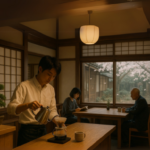




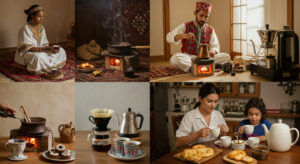








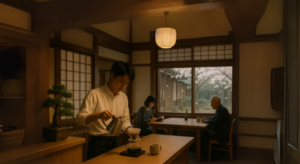
Post Comment